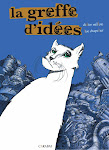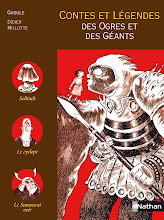
"Armand Abecassis ("A Bible ouverte", Albin Michel, avec l'intervention surréaliste de Didier Millotte qui met son nez partout sans qu'on lui ai rien demandé) : Il y a plusieurs définitions de la connaissance. Il y a la connaissance qui nous est donné par notre corps. C'est une connaissance du monde indirecte puisque les messages du monde traversent le corps pour parvenir à la conscience. Il y a aussi la connaissance que nous constituons par la logique et par les concepts, comme dans le domaine scientifique. Là aussi nous avons une connaissance indirecte, car entre le monde et nous, sont interposées les idées, les systèmes, les structures, les lois.
Didier Millotte : Est-ce vraiment une connaissance ?
Armand Abecassis : La connaissance donnée par l'amour est celle qui, au delà des intermédiaires, va au coeur de l'être connu, immédiatement et sans détour.
Didier Millotte : oui, c'est cela... nous touchons là au plus récents questionnements scientifiques de la fin du XXe siècle. La question de la perception du "réel", ce qu'on a pris pour le réel depuis deux ou trois siècles, par l'outil "cerveau", de son fonctionnement, de son accès à "l'extérieur"... de ce qu'est réellement la connaissance. Recevoir des informations est-ce connaître vraiment ? Ces informations ne seraient-elles que des impulsions électriques dans le cerveau ? J'aime cette idée que lorsqu'on regarde une bougie ou le soleil, notre cerveau, lui, est toujours dans le noir total. Reçoit-il de la lumière réellement ? Non. Il reçoit une impulsions électrique comme appelle "lumière". Et le tour est joué. Cela fait écho aux conférences remarquables du physicien nucléaire Serge Tarassenko qui dit bien que connaître réellement, c'est faire UN avec, pas savoir des choses sûr. Connaître, être unis à, aimer... J'aime la pensée juive. Intelligente, profonde, sage et éclairée. On arrive à Paris. Demain je prend un avion pour New-York. Yeah ! Armand Abecassis (“With Open Bible”, Albin Michel, with a surrealist intervention of Didier Millotte, who sticks his nose into everything without being asked): There are several definitions of knowledge. There’s the knowledge that is given to us by our bodies. This is an indirect knowledge of the world since the messages of the world go through the body to arrive at the conscience. There is also the knowledge which is constituted by logic and concepts, like in the scientific field. There too we have an indirect knowledge, because between the world and us, are interposed the ideas, the systems, the structures, and the laws. Didier Millotte: Is this really a knowledge? Armand Abecassis: The knowledge given by love is that which, beyond the intermediaries, goes to the heart of being known, immediately and directly. Didier Millotte: yes, that’s it…we touch there with the most recent scientific discoveries at the end of the 20th century. The question of the perception of “real”, that which we took for reality for two or three centuries, by the “brain” tool, from the way it operates, from it’s access to the “exterior”…of what knowledge really is. Does receiving information really mean to know? Wouldn’t this information just be electric impulses in the brain? I like the idea that when we look at a candle or the sun, our brain remains in total darkness. Does it really receive light? No. It receives electric impulses called “light”. And there you have it. This echoes the remarkable conferences of Serge Tarassenko, the nuclear physicist who says it well that to really know is to become one with, not to know about. To know, to be united, to love…I like the Jewish thinking. Intelligent, deep, wise and enlightened. We’re arriving in Paris New York


.jpg)




Aucun commentaire:
Enregistrer un commentaire